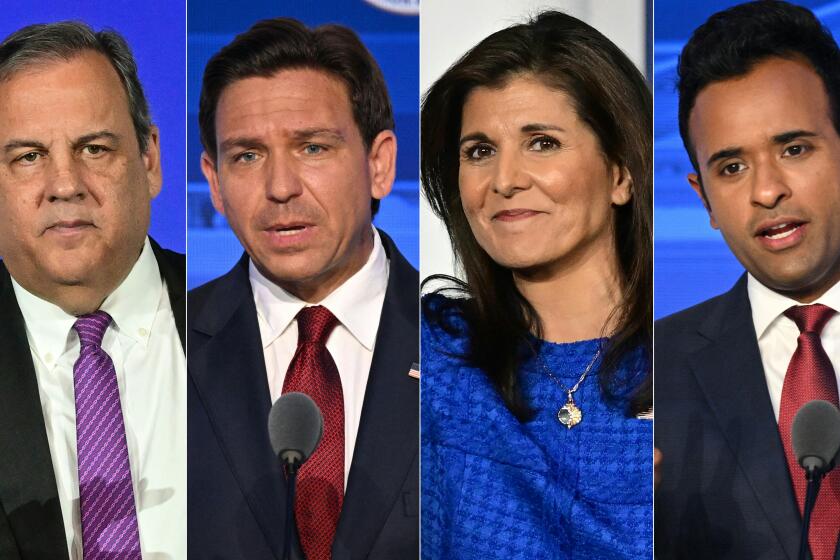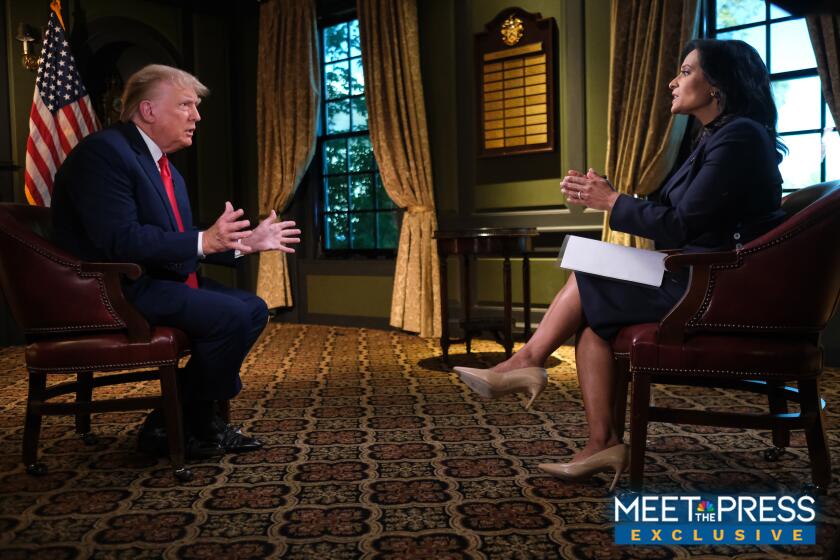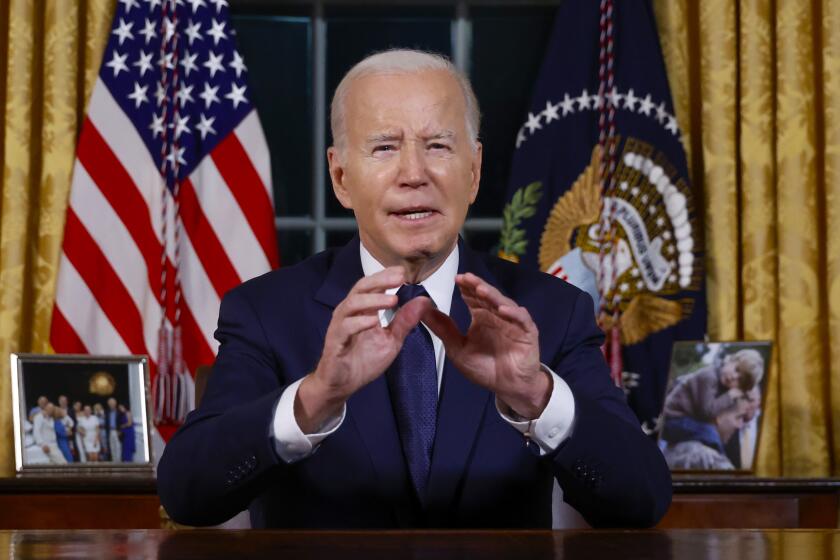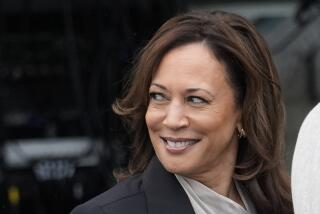Opinion: The GOP challengers are fragmented. Biden’s coalition is weakening. What can stop Trump now?
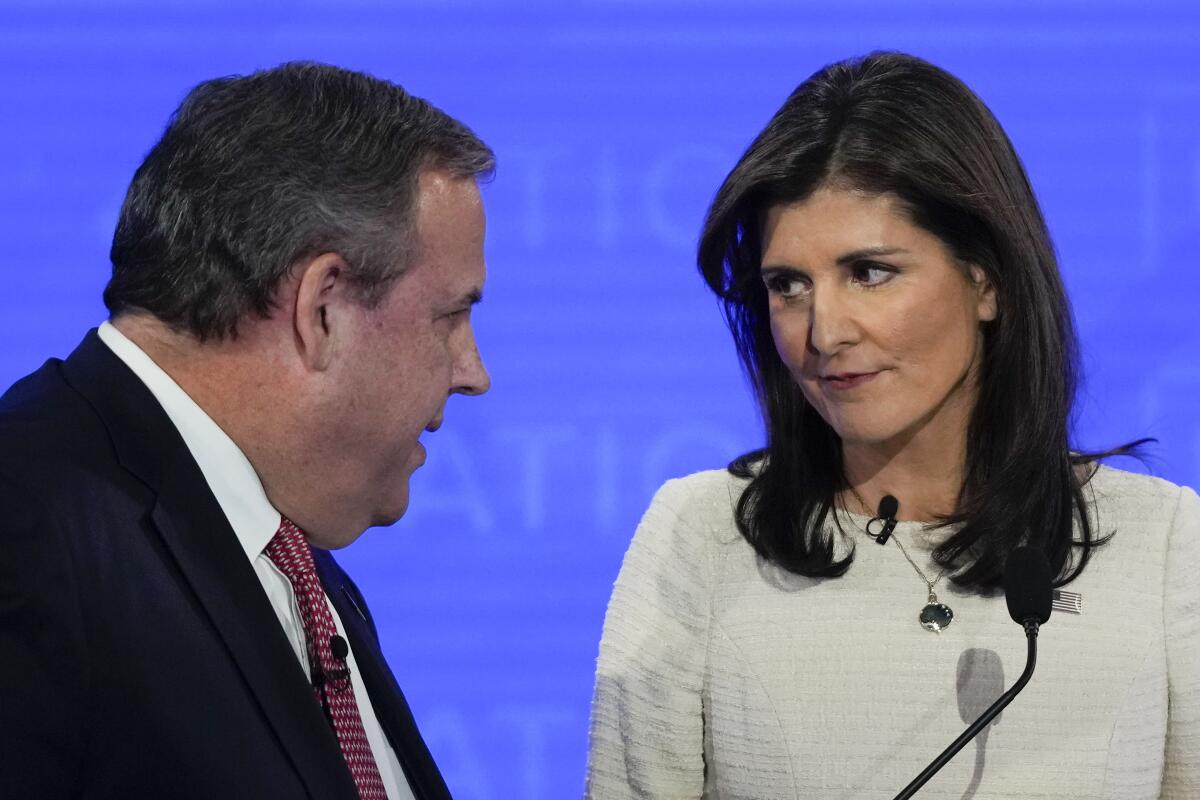
- Share via
In August, on the night before the first Republican presidential primary debate, Donald Trump led the GOP field, polling at 55.4% in Real Clear Politics’ national average. On Wednesday, as his final four challengers took the stage in Alabama, he remained on top, with an RCP average of 61%. It would be unprecedented for a candidate sitting at 60% nationally at this point in a presidential campaign to fail to win his party’s nomination.
The GOP debates have helped two people: Trump — who sat out all four of them — and former U.N. ambassador and South Carolina Gov. Nikki Haley, who used them to improve her national standing. Florida Gov. Ron DeSantis’ numbers are essentially flat, and Vivek Ramaswamy has lost ground with each of his grating performances (Wednesday was his most obnoxious yet).
Some interesting, if loose, alliances took shape in the fourth debate. Former New Jersey Gov. Chris Christie scored points for himself by defending Haley against Ramaswamy’s bloviations, and DeSantis joined Ramaswamy in attacking Haley. It was the pre-Trump GOP versus the post-Trump party.
Trump’s no-debate strategy seems to be working; Haley and DeSantis battle it out in their quest to emerge as the alternative; and Megyn Kelly reappears on the national political stage.
Christie hammered DeSantis for failing to say Trump was “unfit” for the presidency. DeSantis dunked on Christie as they debated transgender surgeries for minors and parental rights. He’s not flashy, but DeSantis systematically churns out debate content that’s squarely in the center of Republican opinion. Haley had a stellar moment on fighting campus antisemitism.
One friend texted me mid-debate: “Does Christie sound like a man thinking about dropping out and endorsing Haley?” Christie says no, but it’s hard to see another outcome for him other than playing spoiler to Haley in New Hampshire. As for Ramaswamy, his candidacy has faltered.
As this is the season of wishes, here’s how each of the other GOP campaigns hopes the primary unfolds:
- Haley rides late momentum to a surprise second place finish in Iowa, using the caucus as a slingshot ahead of New Hampshire and eventually South Carolina.
- DeSantis muscles his way to a surprise win in the caucus, showing everyone that Trump can bleed. He puts Haley out of the race before she makes it to her home state.
- Trump crushes by 20-plus points in Iowa and New Hampshire and effectively ends the contest.
The indicted ex-president, who has a penchant for spewing falsehoods, is leaving traditional media practices looking more inadequate than ever.
Overall, the Trump camp is ecstatic. His superpower has been the fragmented field, and even some consolidation could benefit him (i.e. if DeSantis disappears, his supporters may flow to Trump instead of Haley).
Beyond the primaries, Trump’s advantages are multiplying.
The latest CNN polling, released this week, tells a grim tale for President Biden. He has an overall job approval of 37%, and he’s struggling mightily with key subgroups like independents (36%), Black people (47%), Latino people (42%) and Americans aged 18-34 (33% — a major yikes). The coalition that propelled him to the White House in 2020 is shattering.
That last number is particularly problematic for Biden. It appears to reflect young progressives’ dissatisfaction with the president’s support of Israel in its war against Hamas. Even the White House interns are badgering Biden over the so-called defense as a Palestinian “genocide.” The president is getting squeezed on both ends — his young base, pulling for Hamas, and his reliable Jewish supporters, horrified by the Oct. 7 terrorist attack.
When a U.S. election turns on foreign policy, the incumbent usually does well. The 2024 presidential race could turn that on its head.
Biden ran for president in 2020, he said, to unite the country after Charlottesville, Va., with its chants of “Jews will not replace us,” and to rid our politics of Trump. But dozens of Charlottesvilles have sprung up across this country, with left-wing antisemitism on display on college campuses, in front of Jewish-owned restaurants and in public spaces. Meanwhile, Trump leads Biden in national polls as majorities say Biden has failed on the economy, immigration, crime and other issues.
So far, the president’s slogan is “it could be worse.” Not exactly a visionary reelection argument, although it did carry weight with independent voters in the 2022 midterm, and may resonate yet.
With the Iowa caucuses only a month away, Trump remains the heavy GOP favorite, and the slight favorite against Biden. If third-party candidates achieve ballot access in key states, Biden’s chances could get even weaker.
But Republicans shouldn’t count their chickens. The prospect remains that Trump could be a convicted felon by next November, which would no doubt blunt his chances of beating even a weak Biden.
Here’s the surest bet for the coming election year: the country remaining dissatisfied with a 2020 rematch that nobody really wants.
Scott Jennings is a former special assistant to President George W. Bush and a senior CNN political commentator. @ScottJenningsKY
More to Read
A cure for the common opinion
Get thought-provoking perspectives with our weekly newsletter.
You may occasionally receive promotional content from the Los Angeles Times.
